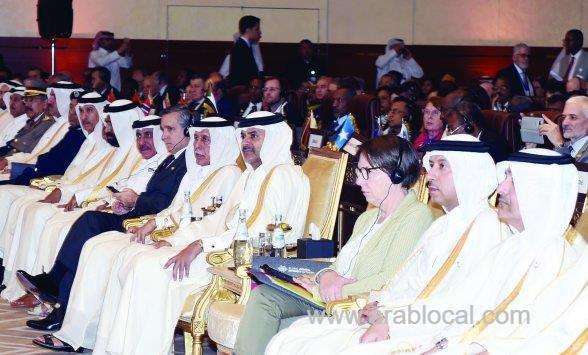
Under the patronage of Amir H H Sheikh Tamim bin Hamad Al Thani, Prime Minister and Minister of Interior, H E Sheikh Khalid bin Khalifa bin Abdulaziz Al Thani yesterday attended the opening session of the second high-level meeting of the Global Judicial Integrity Network.
The meeting being hosted by the Supreme Judiciary Council held under the title ‘Past, Present, Future'. The session was also attended by Speaker of the Shura Council H E Ahmed bin Abdullah bin Zaid Al Mahmoud, a number of Their Excellencies Sheikhs, Ministers, senior officials and heads of judicial bodies, councils and courts from around 120 countries, and a number of officials from United Nations Office on Drugs and Crime (UNODC).
The Global Judicial Integrity Network is one of the key results of the efforts of the UNODC Global Programme for the Implementation of the Doha Declaration, which aims to assist member states in implementing vital areas of the Doha Declaration adopted at the 13th United Nations Congress on Crime Prevention and Criminal Justice in 2015.
The purpose of the second high-level meeting of the Network is to take stock of the achievements of the Network since its launch and discuss the work conducted in the priority areas of the 2018-19 work plan of the Network; discuss existing and emerging challenges related to judicial integrity and explore the efforts made by judiciaries to address them; and identify priority areas for the Network beyond 2019.
Addressing the opening session, President of the Supreme Judicial Council and the President of the Court of Cassation H E Dr. Hassan bin Lahdan Alhassan Almohanadi said that the State of Qatar's hosting of the second high-level meeting of the Global Judicial Integrity Network carried a message of trust from the international legal community in Qatar's orientations and just stances.
'Qatar has become a beacon and an international destination for meetings, conferences and seminars in all fields and at various levels, which reflects the keenness of the wise leadership and the State's orientation to be an active member of the international community with anything that can bring peace and goodness.
He affirmed that the State of Qatar would always meet expectations. 'Qatar, under the wisdom of its leadership and its conscious people of citizens and residents, is and will continue to be an aid for the deprived, he added.
He also pointed out the efforts that were made to develop justice systems. 'The basis of justice is an independent, impartial, unbiased, advanced and efficient judiciary and it is a higher goal that the State seeks to realize with all its institutions as a part of an ambitious program that continues to develop justice systems, including the judicial body.
During his speech, he emphasized the importance of the Network's second meeting that brought together an elite of justice and law from more than 120 countries, including representatives from judicial authorities and bodies and presidents of supreme courts, in addition to representatives of the United Nations, international bodies and organizations, civil society institutions and international personalities that are involved in international judicial cooperation.
He expressed his hope that the meeting would provide an opportunity to for constructive communication, exchange of experiences and learn about other experiences in the field of justice, especially with the presence of a large number of legal and judicial authorities from different legal schools of the world.
On the first day of the high-level meeting, a number of thematic breakout sessions were also held on a number of important themes including ‘Selection and appointment of judges and judicial independence', ‘The judges shall hold their offices during good behavior: codes of conduct and disciplinary measures', ‘Us too? gender-related integrity issues in the judiciary', ‘Judicial independence: new challenges and judicial governance innovations', ‘Enforcing judicial integrity through codes of conduct and ethics training', among others.
Addressing the opening session, John Brandolino, Director, Division of Treaty Affairs, UNODC lauded the achievements made on the ground since the establishment of the Global Judicial Integrity Network. He added that they had developed a series of practical guides on emerging judicial integrity issues and had implemented training programs in more than 45 countries. Brandolino explained that the purpose of the Network was to assist judicial bodies in enhancing judicial integrity and preventing corruption in the judicial system by enhancing communication opportunities, facilitating access to resources and focusing on existing and emerging challenges related to judicial integrity.
SOURCE: MENAFN